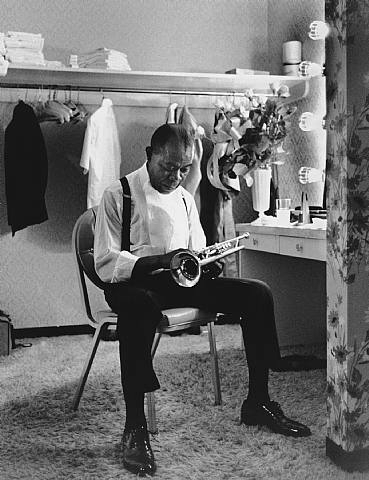Terry Teachout's Blog, page 25
January 30, 2014
TT: Almanac
"The cult of the individual is now almost as great a social crime in the West as it is a political crime in the East. This is unfortunate, as the cult of the individual is the basis of all art."
John Whiting, At Ease in a Bright Red Tie: Writings on Theatre (courtesy of George Hunka)
John Whiting, At Ease in a Bright Red Tie: Writings on Theatre (courtesy of George Hunka)
Published on January 30, 2014 07:00
January 29, 2014
TT: Snapshot
"Scotch Rhapsody," from William Walton's Façade. The poem is by Edith Sitwell and the speakers are Glenn Gould and Patricia Rideout:
(This is the latest in a series of arts-related videos that appear in this space each Monday and Wednesday.)
(This is the latest in a series of arts-related videos that appear in this space each Monday and Wednesday.)
Published on January 29, 2014 08:00
TT: Almanac
"I suggest that the voice you hear today in all branches of literature is not the individual voice but the collective voice. And this especially from any writer under forty. In other words, the writer has become the spokesman not for himself but for a group, an organisation, a class or a sect. The danger is that some don't know they are doing it, and those who do know often consider, and are led to consider it a virtue. 'This young man speaks for his generation.' 'This young woman is the rallying point for all young women with big feet.' You know the sort of thing."
John Whiting, At Ease in a Bright Red Tie: Writings on Theatre (courtesy of George Hunka)
John Whiting, At Ease in a Bright Red Tie: Writings on Theatre (courtesy of George Hunka)
Published on January 29, 2014 07:00
January 28, 2014
TT: Scene of the crime
Today I'm flying up to New York from Florida to rehearse my first play. Last night I slept in the room where, four years ago this month, I wrote it.
I remember that week as though it had been last week. John Schreiber, who now runs the New Jersey Performing Arts Center, had written to me from out of the blue on Christmas Eve, telling me that he'd just read Pops: A Life of Louis Armstrong and wondered whether there might be a play in it:
Until then I'd given no thought whatsoever to writing a play, about Armstrong or anyone else, but John had been a producer in a previous life, and it struck me that I ought to take his suggestion seriously.
 A couple of weeks later, Mrs. T and I went down to Winter Park, Florida, so that I could spend a month as scholar-in-residence at Rollins College's
Winter Park Institute
. As a result, I had--for once--some free time on my hands. I found myself thinking about the next-to-last illustration in Pops, Eddie Adams' famous photograph of Armstrong sitting backstage in a Las Vegas dressing room a few months before his death in 1971, looking old and weary.
A couple of weeks later, Mrs. T and I went down to Winter Park, Florida, so that I could spend a month as scholar-in-residence at Rollins College's
Winter Park Institute
. As a result, I had--for once--some free time on my hands. I found myself thinking about the next-to-last illustration in Pops, Eddie Adams' famous photograph of Armstrong sitting backstage in a Las Vegas dressing room a few months before his death in 1971, looking old and weary.
All at once the idea for a one-man play about Armstrong's last gig popped into my head. It wasn't quite fully formed, but it was close enough to allow me to get started. I sat down and went to work. Four days later I typed the last sentence of the first draft of Satchmo at the Waldorf and emerged from a near-hypnotic frenzy of creativity. It had poured out of me so fast that I felt as though I'd been invaded by a demon, and was forced to exorcise myself by writing until I dropped.
On January 25 I publicly acknowledged for the first time what I'd been up to:
Now we know. What followed was a long, improbable journey that has led me at last to the stage door of New York's Westside Theatre, where Satchmo will open on March 4. But it started right here, in the upstairs office-bedroom of a condo owned by Rollins College, and returning there on Saturday afternoon felt more than a little bit like coming home.
 Mrs. T and I have spent a total of three stretches in this comfortable apartment, long enough to be able to find our way around in the dark. It's a five-minute walk from our front door to the center of campus. The surrounding neighborhood is leafy and quiet, but close enough to the railroad tracks that you can easily hear train whistles blowing in the middle of the night.
Mrs. T and I have spent a total of three stretches in this comfortable apartment, long enough to be able to find our way around in the dark. It's a five-minute walk from our front door to the center of campus. The surrounding neighborhood is leafy and quiet, but close enough to the railroad tracks that you can easily hear train whistles blowing in the middle of the night.
A good place to write, in other words, and I've taken full advantage of it over the years. Among other things, I've knocked out a couple of dozen Wall Street Journal pieces in that office, as well as the first chapters of Duke: A Life of Duke Ellington . This year I'm working on a lecture, a book proposal, and another play. But no matter how many times Mrs. T and I return here in the future, I doubt I'll ever again have a week quite like the one that turned me, for better or worse, into a playwright.
I remember that week as though it had been last week. John Schreiber, who now runs the New Jersey Performing Arts Center, had written to me from out of the blue on Christmas Eve, telling me that he'd just read Pops: A Life of Louis Armstrong and wondered whether there might be a play in it:
Reading your book, I saw (in my mind) a one-person show of Louis' life told by Louis with the specificity, sensitivity, wisdom, humor and sense of history and moment that shines through in your storytelling. Pops was a great man and a great artist whose life intimately intersected with (and sometimes led) American culture for seventy years.
Is there a theatrical here? Lord knows. If you're game, I'd love to discuss the possibility with you.
Until then I'd given no thought whatsoever to writing a play, about Armstrong or anyone else, but John had been a producer in a previous life, and it struck me that I ought to take his suggestion seriously.
 A couple of weeks later, Mrs. T and I went down to Winter Park, Florida, so that I could spend a month as scholar-in-residence at Rollins College's
Winter Park Institute
. As a result, I had--for once--some free time on my hands. I found myself thinking about the next-to-last illustration in Pops, Eddie Adams' famous photograph of Armstrong sitting backstage in a Las Vegas dressing room a few months before his death in 1971, looking old and weary.
A couple of weeks later, Mrs. T and I went down to Winter Park, Florida, so that I could spend a month as scholar-in-residence at Rollins College's
Winter Park Institute
. As a result, I had--for once--some free time on my hands. I found myself thinking about the next-to-last illustration in Pops, Eddie Adams' famous photograph of Armstrong sitting backstage in a Las Vegas dressing room a few months before his death in 1971, looking old and weary.All at once the idea for a one-man play about Armstrong's last gig popped into my head. It wasn't quite fully formed, but it was close enough to allow me to get started. I sat down and went to work. Four days later I typed the last sentence of the first draft of Satchmo at the Waldorf and emerged from a near-hypnotic frenzy of creativity. It had poured out of me so fast that I felt as though I'd been invaded by a demon, and was forced to exorcise myself by writing until I dropped.
On January 25 I publicly acknowledged for the first time what I'd been up to:
I've been working on a new opera libretto and--brace yourself--a play. Yes, the play is a great big honking maybe, but we'll see what, if anything, comes of it.
Now we know. What followed was a long, improbable journey that has led me at last to the stage door of New York's Westside Theatre, where Satchmo will open on March 4. But it started right here, in the upstairs office-bedroom of a condo owned by Rollins College, and returning there on Saturday afternoon felt more than a little bit like coming home.
 Mrs. T and I have spent a total of three stretches in this comfortable apartment, long enough to be able to find our way around in the dark. It's a five-minute walk from our front door to the center of campus. The surrounding neighborhood is leafy and quiet, but close enough to the railroad tracks that you can easily hear train whistles blowing in the middle of the night.
Mrs. T and I have spent a total of three stretches in this comfortable apartment, long enough to be able to find our way around in the dark. It's a five-minute walk from our front door to the center of campus. The surrounding neighborhood is leafy and quiet, but close enough to the railroad tracks that you can easily hear train whistles blowing in the middle of the night.A good place to write, in other words, and I've taken full advantage of it over the years. Among other things, I've knocked out a couple of dozen Wall Street Journal pieces in that office, as well as the first chapters of Duke: A Life of Duke Ellington . This year I'm working on a lecture, a book proposal, and another play. But no matter how many times Mrs. T and I return here in the future, I doubt I'll ever again have a week quite like the one that turned me, for better or worse, into a playwright.
Published on January 28, 2014 09:00
TT: Lookback
From 2004:
Read the whole thing here .
Ivy Compton-Burnett, the English novelist, told a friend late in life that she could no longer read Jane Austen with pleasure, not because her admiration for Austen had lessened but because she'd read her novels so many times that she had them virtually by heart, and hence could no longer be surprised by them. When I read that, I wondered: is it really possible to exhaust a masterpiece? Much less an entire art form? I can't imagine being unable to hear anything new in Falstaff or the Mozart G Minor Symphony, though I suppose it could happen. And as for a person who came to feel that music or painting or poetry had nothing more to say to him, he'd be in dire straits indeed...
Read the whole thing here .
Published on January 28, 2014 08:00
TT: Almanac
"A work of art is the statement of one man. It is one of the noblest, because it is one of the most selfless activities of human existence. It has nothing to do with an audience or a wish to please. It does not necessarily entertain, instruct or enlighten. It can do any one or all of these things, but that it should is not the artist's concern. That is the work of art in its perfect state. The thing is there: an audience taking from it what it can. It is not the artist's job to simplify the means of communication."
John Whiting, At Ease in a Bright Red Tie: Writings on Theatre (courtesy of George Hunka)
John Whiting, At Ease in a Bright Red Tie: Writings on Theatre (courtesy of George Hunka)
Published on January 28, 2014 07:00
January 27, 2014
TT: Down and out
 Whenever Mrs. T and I stay on Florida's Sanibel Island, we make a point of watching the sun go down each evening. It wasn't until well into adulthood that I saw
my first sunset
, and watching a good one while standing on a patio located a few hundred yards from the Gulf of Mexico is at least as pleasing a spectacle as spending a few minutes standing in front of a great painting hanging in a museum.
Whenever Mrs. T and I stay on Florida's Sanibel Island, we make a point of watching the sun go down each evening. It wasn't until well into adulthood that I saw
my first sunset
, and watching a good one while standing on a patio located a few hundred yards from the Gulf of Mexico is at least as pleasing a spectacle as spending a few minutes standing in front of a great painting hanging in a museum.All things must pass, good and bad alike, and so the two of us sighed deeply as we watched the sun set on Friday, knowing that we'd be leaving Sanibel the following morning, not to return for at least another year. Afterward we drove to Doc Ford's to eat one last meal of Yucatan shrimp , then returned to our seaside cottage in a frame of mind for which "wistful" isn't a sufficiently strong word.
We drove the next morning from Sanibel to Winter Park, another of our regular destinations, where I'll be spending the next three weeks in residence at Rollins College's Winter Park Institute , under whose welcoming auspices, among other things, I wrote the first draft of Satchmo at the Waldorf and a good-sized portion of Duke: A Life of Duke Ellington .
 Like its predecessors, this stay won't be a holiday: I
shared a stage
with Morten Lauridsen yesterday afternoon, and on February 4 I'll be giving a public lecture called "Duke Ellington: The Man Behind the Mask." I also plan to work on another play while I'm here. In between these events, I'll be seeing shows elsewhere in Florida, and I'll also be flying up to New York to pay a couple of visits to Broadway and help out at rehearsals for the off-Broadway transfer of Satchmo at the Waldorf, which starts preview performances on February 15. Hence my calendar will likely be too crowded to see very many sunsets, with or without Mrs. T. We'll have to settle for our memories of Sanibel, a place so miraculously peaceful that it often pops into our minds throughout the rest of the year.
Like its predecessors, this stay won't be a holiday: I
shared a stage
with Morten Lauridsen yesterday afternoon, and on February 4 I'll be giving a public lecture called "Duke Ellington: The Man Behind the Mask." I also plan to work on another play while I'm here. In between these events, I'll be seeing shows elsewhere in Florida, and I'll also be flying up to New York to pay a couple of visits to Broadway and help out at rehearsals for the off-Broadway transfer of Satchmo at the Waldorf, which starts preview performances on February 15. Hence my calendar will likely be too crowded to see very many sunsets, with or without Mrs. T. We'll have to settle for our memories of Sanibel, a place so miraculously peaceful that it often pops into our minds throughout the rest of the year.For New Yorkers, tranquility is always at a premium. On Sanibel, it comes unbidden each evening, just before the sun starts to slide behind the horizon, leaving quiet darkness in its wake. I can never see that happen often enough.
Published on January 27, 2014 08:00
January 26, 2014
TT: Just because
Suzanne Farrell and Peter Martins dance George Balanchine's Tzigane in 1977. The score is by Maurice Ravel:
(This is the latest in a series of arts-related videos that appear in this space each Monday and Wednesday.)
(This is the latest in a series of arts-related videos that appear in this space each Monday and Wednesday.)
Published on January 26, 2014 21:00
TT: Almanac
"I once coined a phrase--High Definition Performance--to sum up what I liked most about authentic stars. In a nutshell (and many of the people who have this quality could fairly be described as nutcases), H.D.P. means the ability--shared by great athletes, sportsmen, bullfighters, and conversationalists as well as stage performers--to communicate the essence of one's talents to an audience with economy, grace, no apparent effort, and absolute, hard-edged clarity of outline."
Kenneth Tynan, The Sound of Two Hands Clapping (courtesy of Bobby Franklin)
Kenneth Tynan, The Sound of Two Hands Clapping (courtesy of Bobby Franklin)
Published on January 26, 2014 21:00
January 24, 2014
TT: Seventeen sensations
In today's Wall Street Journal drama column, I review an outstanding Florida revival of
A Chorus Line
. Here's an excerpt.
* * *
What was the most influential musical of the '70s? If you take Stephen Sondheim's shows out of contention, many theatergoers would likely opt for "Chicago" or "A Chorus Line," and convincing cases can be made for either choice. Both opened on Broadway in 1975 and were long-running hits, and both have since been successfully revived. Both are anti-naturalistic "presentational" shows in which the characters break through the imaginary "fourth wall" and engage directly with the audience, although "A Chorus Line" blurs this distinction by placing the fictional "director" in the auditorium and having the performers speak and sing to him. Above all, both were frank about sex in a way that was daring four decades ago, at least in the crowd-pleasing field of musical comedy.
 The 1996 revival of "Chicago" is still running--it is, in fact, the longest-running revival in the history of Broadway--but "A Chorus Line" hasn't been seen there since 2008. Most regional companies find it too choreographically challenging to mount, and those that dare to give it a go usually strive to reproduce Michael Bennett's original production as exactly as possible. (So did the Broadway revival, which was a near-facsimile.) Not having seen it for eight years, I thought it would be interesting to catch a performance by the Maltz Jupiter Theatre, one of south Florida's most successful companies, and find out how it holds up. It's no surprise that "A Chorus Line" still works, despite palpable flaws that have grown more glaring since 1975. The bigger, better news is that Maltz Jupiter is giving it a very well-danced and unusually well-acted production, one that plays down the show's weaknesses while maximizing its considerable strengths....
The 1996 revival of "Chicago" is still running--it is, in fact, the longest-running revival in the history of Broadway--but "A Chorus Line" hasn't been seen there since 2008. Most regional companies find it too choreographically challenging to mount, and those that dare to give it a go usually strive to reproduce Michael Bennett's original production as exactly as possible. (So did the Broadway revival, which was a near-facsimile.) Not having seen it for eight years, I thought it would be interesting to catch a performance by the Maltz Jupiter Theatre, one of south Florida's most successful companies, and find out how it holds up. It's no surprise that "A Chorus Line" still works, despite palpable flaws that have grown more glaring since 1975. The bigger, better news is that Maltz Jupiter is giving it a very well-danced and unusually well-acted production, one that plays down the show's weaknesses while maximizing its considerable strengths....
* * *
Read the whole thing here .
The original cast of A Chorus Line performs "I Hope I Get It" on the 1976 Tony Awards telecast:
* * *
What was the most influential musical of the '70s? If you take Stephen Sondheim's shows out of contention, many theatergoers would likely opt for "Chicago" or "A Chorus Line," and convincing cases can be made for either choice. Both opened on Broadway in 1975 and were long-running hits, and both have since been successfully revived. Both are anti-naturalistic "presentational" shows in which the characters break through the imaginary "fourth wall" and engage directly with the audience, although "A Chorus Line" blurs this distinction by placing the fictional "director" in the auditorium and having the performers speak and sing to him. Above all, both were frank about sex in a way that was daring four decades ago, at least in the crowd-pleasing field of musical comedy.
 The 1996 revival of "Chicago" is still running--it is, in fact, the longest-running revival in the history of Broadway--but "A Chorus Line" hasn't been seen there since 2008. Most regional companies find it too choreographically challenging to mount, and those that dare to give it a go usually strive to reproduce Michael Bennett's original production as exactly as possible. (So did the Broadway revival, which was a near-facsimile.) Not having seen it for eight years, I thought it would be interesting to catch a performance by the Maltz Jupiter Theatre, one of south Florida's most successful companies, and find out how it holds up. It's no surprise that "A Chorus Line" still works, despite palpable flaws that have grown more glaring since 1975. The bigger, better news is that Maltz Jupiter is giving it a very well-danced and unusually well-acted production, one that plays down the show's weaknesses while maximizing its considerable strengths....
The 1996 revival of "Chicago" is still running--it is, in fact, the longest-running revival in the history of Broadway--but "A Chorus Line" hasn't been seen there since 2008. Most regional companies find it too choreographically challenging to mount, and those that dare to give it a go usually strive to reproduce Michael Bennett's original production as exactly as possible. (So did the Broadway revival, which was a near-facsimile.) Not having seen it for eight years, I thought it would be interesting to catch a performance by the Maltz Jupiter Theatre, one of south Florida's most successful companies, and find out how it holds up. It's no surprise that "A Chorus Line" still works, despite palpable flaws that have grown more glaring since 1975. The bigger, better news is that Maltz Jupiter is giving it a very well-danced and unusually well-acted production, one that plays down the show's weaknesses while maximizing its considerable strengths....* * *
Read the whole thing here .
The original cast of A Chorus Line performs "I Hope I Get It" on the 1976 Tony Awards telecast:
Published on January 24, 2014 08:00
Terry Teachout's Blog
- Terry Teachout's profile
- 45 followers
Terry Teachout isn't a Goodreads Author
(yet),
but they
do have a blog,
so here are some recent posts imported from
their feed.



